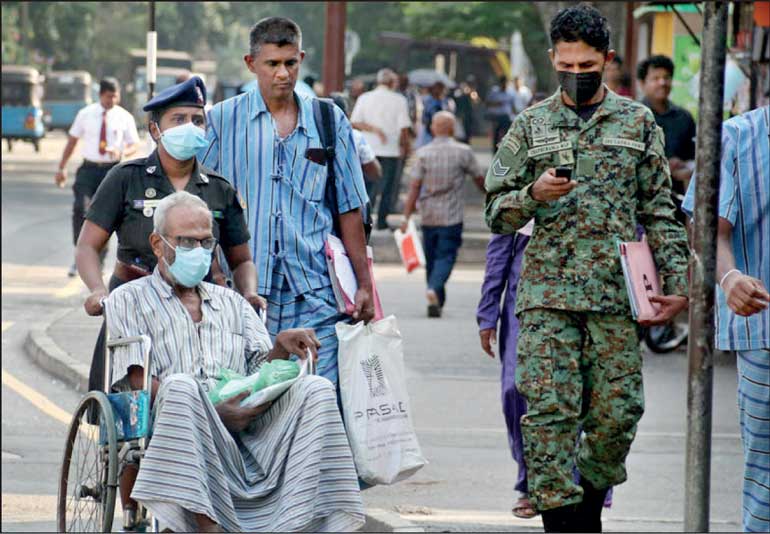Monday Feb 16, 2026
Monday Feb 16, 2026
Wednesday, 17 January 2024 00:20 - - {{hitsCtrl.values.hits}}

Demand to double DAT holding innocent patients to ransom
 Last week, according to media reports all Government hospitals were almost completely closed. Except for sensitive and crucially important places like the Apeksha cancer hospital, the Lady Ridgeway children’s hospital, Emergency admissions and Cardiac treatment, all others were reported closed from Tuesday to Friday and came back to normalcy by Saturday morning. Not due to lack of medicines or other necessities, but due to a string of work stoppages by all hospital staff other than the medical doctors.
Last week, according to media reports all Government hospitals were almost completely closed. Except for sensitive and crucially important places like the Apeksha cancer hospital, the Lady Ridgeway children’s hospital, Emergency admissions and Cardiac treatment, all others were reported closed from Tuesday to Friday and came back to normalcy by Saturday morning. Not due to lack of medicines or other necessities, but due to a string of work stoppages by all hospital staff other than the medical doctors.
They were all protesting against the Government’s decision to double the Rs.35,000 per month DAT allowance of medical doctors to Rs.70,000, ignoring all others in the health sector. Health sector trade unions including nurses, paramedics, ophthalmologists, family health and even public health inspectors demanded an increase in their allowances by Rs.35,000 per month. Paramedics were reported as having threatened to go on a continuous strike, “if the Government fails to address the issue.” That was to say, they want the issue settled with a Rs.35,000 increase in their take home pay.
They justify their demand on the grounds that, if medical doctors cannot survive the increase in the cost of living with their present take home salary and PP income, if they need such increase in their take home pay with the DAT allowance doubled, then none in the health sector would survive with their present salaries. Most in lower categories do not even have a “take home pay” as large as that of the increase of DAT allowance to Rs.70,000 said a hospital staff, when I queried about their demand for an equivalent to the DAT increase. A trained Government nurse with five years’ service would get only Rs.46,000 I was told.
GMOA Secretary Dr. Haritha Aluthge is on record saying, there is no justification in demanding an increase equivalent to that of DAT by others. He asked where on earth support staff in the judicial system gets wage increases similar to those given to Judges. That argument by the GMOA boss against salary increases for others in the health sector cannot be compared to that of Judges by any means. Judges do not have overtime pay as doctors do. Nor do Judges indulge in private practice as doctors do. Doctors in Government service enjoy both overtime pay and PP, in total violation of medical ethics and morals. Aluthge’s argument thus exposed the nauseating ego and the selfish mindset of the GMOA. DAT by itself is no legitimate allowance, the GMOA forced the then Government to accept at the expense of innocent patients in Government hospitals held captive. Not only DAT, every salary increase and privilege the medical doctors enjoy has been at the expense of these patients.
Disturbance, Availability and Transport allowance
I believe, people should know what DAT is that they would have to shoulder with the massive increase announced. DAT is an exclusive monthly allowance paid to Government medical doctors in hospitals. DAT stands for “Disturbance, Availability and Transport”. It is about medical doctors being called while off duty to attend to warded patients in the hospital he or she is posted in. What the GMOA says is, if medical doctors are “disturbed” when off duty and called to attend to a patient and if they make themselves “available” despite being off duty, they should be paid for all that and that is the DAT allowance.
There are around 13,000 medical doctors attached to hospitals out of the 17,000 plus medical doctors in Government service. Of them, only about 11,000 take care of patients in hospital wards and OPDs.
DAT has no criteria
Technically they are the only medical doctors who should be qualified for DAT. Qualifying for DAT does not necessarily mean they have to be paid the DAT allowance every month. According to its explanation DAT is for doctors that make such visits. How many medical doctors are disturbed on an average and make themselves available for such calls during a month? Does it mean a single visit a month would qualify a doctor to have the now increased monthly DAT allowance of Rs.70,000?
DAT has no criteria. It carries with it a consciously camouflaged aberration in implementation. Though expressed as “off duty hospital visits” DAT is a lump sum monthly allowance. There are no calculations possible for single visits in DAT. Therefore, no individual records of frantic calls for doctor visits to hospitals are necessary. DAT monthly allowance was approved by the Treasury on principle and it is now doubled from this January as approved by the Cabinet of Ministers. I would therefore, not be surprised if all 17,000 plus Government medical officers are paid DAT, including those released from service for trade union work or for funded projects.
Illegitimacy and immorality in privileges enjoyed by GMOs
There is illegitimacy and immorality in most privileges that Government medical officers (GMO) enjoy. Perhaps in the whole world, 17,000 plus Government medical doctors remain the only public sector that enjoy the right to be on duty without recording their time of arrival for duty and departure, but have the right to claim overtime. They definitely are the only unique profession in public service who have the right to claim overtime payments based on their personal entries made in their own private diaries.
It has now become a practice for GMOs to demand anything they wish holding the innocent patients to ransom. The demand to double the DAT was no different. This being a year of election aspirations the Government was hesitant in antagonising them, regarding them as “social influencers”. But that may not be the case with paramedics and supporting staff, who are not thought of as “social influencers”. That would by implication make this DAT increase an “election graft”. We know of election budgets, price reductions, samurdhi benefits and such that come as election grafts. What we do not know or do not want to know is most such Government decisions should be brought to Parliament and debated before implementation, if they are not proposals included in the Annual Budget approved by Parliament, for the simple reason, the Constitution holds Parliament as the sole authority on public finance.
This should therefore apply to the DAT increase that is about public finances. If all 17k plus GMOs are to be paid DAT, the burden on the already economically hunched people would be a colossal sum of about Rs. 14.5 billion this year alone. Therefore, on principle Parliament should know what categories of medical doctors are paid DAT. Are medical doctors in health administration paid DAT? Should it be a flat monthly allowance, instead of a “payment on visit”? What would the Annual Budget be, if DAT is paid on visits? Should not these details be made available to Parliament for this massive sum to be approved and allowed?
Transparency and accountability needed
Why all that should be brought to Parliament for approval is for the people to know how their heavily overtaxed money is disbursed and for what. It is about transparency and accountability that is at present absent. It is about holding political leaderships in Government accountable to the people. It is also about de-politicising such decisions that lack policy and principles and therefore, allows for political patronage.
In conclusion, let me therefore, say this for future consideration. Except on two rare occasions, when the President Kumaranatunge and the Sirisena-Wickremesinghe Governments under worker pressure increased private sector salaries by Rs.1,000 and 2,000 respectively on “budgetary relief allowances” Governments cannot technically decide salary increases for the private sector employees, who are also taxpayers, mostly as contributors to the 80 % indirect tax. This has left a yawning income disparity between the larger majority of the private sector workers and the public sector. Yet it is this private sector employee and not the public sector employee that earn the much needed “dollar income” to the country on which others live as comfortable as they could be. It is therefore important to have a system that would allow respectability and reasonable treatment for the private sector employees too in decision making. Trade unions should therefore demand a “National Labour and Employment Policy” to be adopted in Parliament that would establish an independent “National Wages Commission” wholly responsible to Parliament to decide on wage demands and increases of both public and private sectors. The Labour and Employment policy should seriously consider a “six-hour working day in a five-day working week” for employees to have adequate free time for recreation and entertainment. It is now an accepted fact that employees with job satisfaction and free time are far more productive than the present day highly overworked employees. The “National Wages Commission” should announce an annual “Minimum National Living Wage” that for sure would have to be above Rs.75,000 per month this year, if based on numbers in the latest Household Income and Expenditure Survey (HI&ES) of the Census and Statistics Department.
But I doubt, the politicised public sector trade unions including the GMOA would go for such a proposal. For they will not be able to use political patronage and muscle power as they do now to push Governments to decide for them.